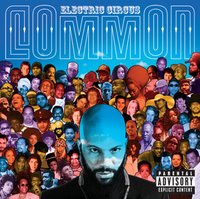 Anyone who remembers Hip Hop Infinity will probably chuckle to learn that I was down with HHI briefly. Like two reviews brief. They were shaky on the pay, but you could also review and get your ish reviewed, so I did it more for the ancillary artist benefits. Which took two reviews to find out it wasn't worth it. Here's a couple links to message board hearsay and story-swapping on the legend of HHI.
Anyone who remembers Hip Hop Infinity will probably chuckle to learn that I was down with HHI briefly. Like two reviews brief. They were shaky on the pay, but you could also review and get your ish reviewed, so I did it more for the ancillary artist benefits. Which took two reviews to find out it wasn't worth it. Here's a couple links to message board hearsay and story-swapping on the legend of HHI.Anyways for the archives, here's an old review of Common's Electric Circus I did for HHI (2002).
 EC Review - HHI
EC Review - HHIAs much as Resurrection signaled Common's (then known as Common Sense) birth as an artist, his latest project Electric Circus distinguishes his artistic evolution from others who are satisfied with operating within the current parameters of hip hop status quo. Artists like Common allow the genre to expand its horizon and become something more than what we thought it could be. A negative, but necessary, consequence of trying to pioneer new territory is the backlash of those who don't agree with the artist's vision. It is an element of artistic responsibility to shoulder the burden of making that vision clear. This is the essence of the artist paradox-- trying to make progressive and personal work that appeals universally.
Where Common typically excels at the former, his success at the latter is qualified. Invoking the memory of The Beatles and their Sgt. Pepper’s Lonely Hearts Club Band with the album cover, Electric Circus appears to be a project from an artist who is consciously trying to boost that universal appeal, but remains too personal and principled to ultimately achieve that goal.
As with his previous release Like Water for Chocolate, Common relies heavily on the Soulquarians for production on Electric Circus. In fact, it might be said that this association is what distinguishes Common from other "conscious rappers." It is the music that provides the truly progressive foundation for Common to build on. Questlove, Jay-Dilla and James Poyser are the head architects who provide the aesthetic appeal to Electric Circus. The Neptunes also make two quality contributions with the two singles, "Come Close" and "I Got a Right Ta." To their credit, these cuts fit in with the distinctive sound and vibe of the album as opposed to sounding like two singles forced in just to have Neptunes production. "Come Close," for instance, is much different than the typical Neptunes sound.
Common and the 'quarians have enlisted a lot of help to create this eclectic set, collaborating with artists such as the aforementioned Neptunes, Prince, Laetitia Sadler, Sonny from P.O.D and Erykah Badu among many others. All of this helps the Soulquarians create a vibe distinctive from their standard urban-soul-music associated with Like Water for Chocolate, The Roots and Jill Scott. The heavy use of electric guitars creates a sound more in line with Jimi-Hendrix-on-hip-hop, and not only because one of the cuts, "Jimi Was a Rock Star", is a Jimi tribute. Overall, the producers and musicians have a lot to be proud of on Electric Circus, it is the strongest suit of the album.
If there is a criticism of Electric Circus, it is directed at Common for not completely maximizing the potential that the accompanying music provides. Viewed as a whole, Electric represents a tremendous artistic step forward, whereas on an individual song level those familiar with Common will quickly recognize the same themes he has trumpeted since his third release One Day It Will All Make Sense. There is nothing inherently wrong with this, of course, but just as thug rappers get criticized for regurgitation of the same "drugs, money and hoes" rubbish, so must more intellectually oriented artists be held to the same high standard for variety. There are plenty of conscious emcees who preach love of self and attack the music business from their lofty educated pedestal, so lines like "You ain't supposed to rhyme/ better off with a clothing line/ in this business of pimps, many hoes get signed" may no longer carry the same resonance as they did five years ago.
That said, Common remains in the lyrically elite and is now passionate about defending his right to change with lines like "I'm the only cat in hip hop/ that can go into a thrift shop/ bring that get-up to the ghetto and get props." Obviously, his evolution and maturity may render him inaccessible for those who don't share his passion for religion and black pride, "Trying to test the reaction of the people/ see through, trying to out act Don Cheadle/ I speak to original Hebrews, you know how we do." Artistic license can be given to an emcee like Common, however, because his upside and creativity will always outweigh his occasional didactic rant. For example, a song like "I Am Music" is a highlight that follows in the creative footsteps of "I Used to Love H.E.R" and "1, 2 Many," as Common posits himself as music itself, "On every station it's hot, you can't stop my heat/ I taught Jay and Dre how to rock the beat/ on what's going on today I got to speak." Also to his credit, like many of our best artists are doing in response to the issue of how to keep the lyrical presentation fresh when most everything that can be said has been said, Common makes a conscious effort to change his style, cadence and delivery on various songs (with varied results), ranging from a hard rock approach in "Electric Wire Hustler Flower" to slow and deliberate in "Come Close" to more haphazard flows very reminiscent of Sadat X in "I Got A Right Ta" and the conventional lyricism in "Soul Power." All in all, Common brings more to the table than most, but his resume creates high expectations and perhaps conceptuality is the area where he could find room for further growth.
Through his new image and presentation of himself and his music, Common is clearly conscious of trying to break through to a higher level of commercial success. There should be no mistaking that images of Jimi Hendrix and the Beatles are conjured up for a reason. However, he abides by what he preaches in his lyrics and does not compromise the music itself for the purpose of commercial gain. Electric Circus is a musical masterpiece, it is visceral and inimitable and it challenges our current hip hop production standards. Lyrically, however, Common does not entirely match the multi-faceted nature of the music that supports him. One suspects his principles and "consciousness" will end up being the traits that stymie the breakthrough potential of this album. If he used the music as a stage instead of as a pulpit, he would probably garner the commercial validation he desires and deserves. As such, Common remains a bit inaccessible. But despite some faults, Electric Circus is above all a beautiful album and one never knows in the music biz-- it will be interesting to see if Common's image consciousness can coincide with a beautiful work of art and make for successful business.


The Assimilated Negro down with white nerd-hop central? Somehow it all makes sense.
ReplyDeletePretty good review. Most of the production is lovely. Though you call Com to task for his mediocre lyrics, you are only somewhat critical of his vocals, which were largely weak, and even horrendous at times.
Monch over the EC beats = greatness;
watered down, shell-of-his- Resurrection-self over these beats = not so much.
Wait, who were you on HHI?
ReplyDelete